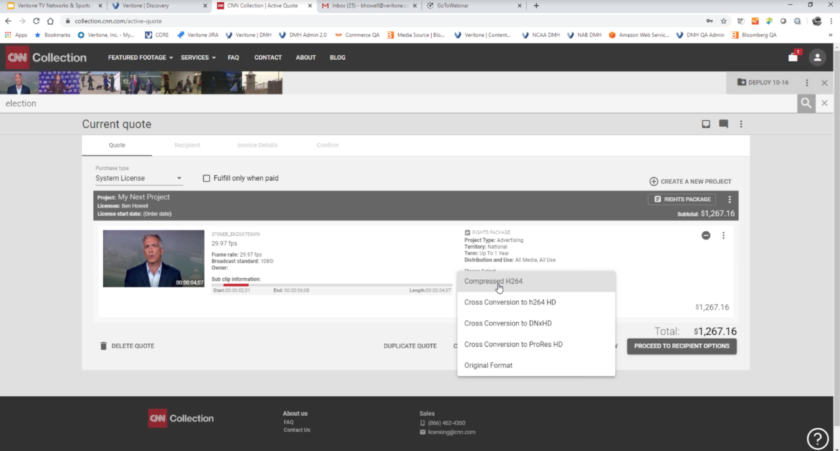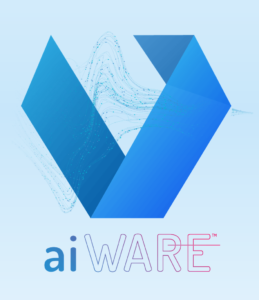M+E Connections

Veritone Eyes AI Opportunities for M&E
Story Highlights
Veritone made the most of its April 22 webinar, showcasing what it would have touted at this month’s NAB Show: an artificial intelligence platform (aiWARE) that’s constantly being optimized with the needs of the media and entertainment industry in mind.
“As it pertains to TV networks, we’re really applicable at every phase in the content lifecycle,” Logan Ketchum, director of sales and strategic partnerships at Veritone, said during the webinar “Proven AI for TV Networks: Hyper Indexed + Highly Intelligent Content for Linear TV and VOD.”
That is a “seemingly broad statement, but it truly does depend on the level of effort and really involvement that our customers want to have as it pertains to implementing artificial intelligence within their respective company,” he said.
For example, Bloomberg “has the resources and the desire to be heavily involved in the process and to take” Veritone’s application programming interfaces (APIs) and “run with it, injecting AI early in the content lifecycle and then … harvesting the metadata associated to those outcomes and the tools that we offer throughout the process of their media business,” he said.
 ESPN, on the other hand, has the resources also, “but for them primarily we work directly with their business units and provide front-end applications through which they analyze content and form strategies,” he noted.
ESPN, on the other hand, has the resources also, “but for them primarily we work directly with their business units and provide front-end applications through which they analyze content and form strategies,” he noted.
Other network brands that Veritone works with include A+E Networks, Big Ten Network (BTN), CBS News, CNBC, CNN, HBO, NBCUniversal, Pac-12 Networks, Tennis Channel and Voice of America, he noted.
He went on to highlight the first use case that Veritone has been offering since the start through its applications: Content intelligence.
With Veritone’s flagship Discovery application, “we enable users to search and clip and analyze clips or a series of clips” – what it calls a Watchlist – and then “analyze those in relation to consumption or engagement metrics, whether it’s Nielsen or their own internal … metrics” to get a better understanding of what is happening on their channels and “how they can use that information to drive what happens tomorrow,” he explained.
Veritone’s Optical Character Recognition (OCR), meanwhile, “literally scrapes the screen of any on-screen text and time correlates that for a search and discovery perspective, he noted. It also uses face recognition he said is trained to recognize “over 1,200 unique faces.”
The company’s Libraries, meanwhile, “essentially renders anything said or seen on screen completely searchable [and] trackable within about 10 minutes of that content actually airing,” he said, adding: “We’re processing these engines in real time. We’re creating a really, really robust metadata set that is then … indexed or time correlated to the linear feeds and then, in certain cases, we’re passing that metadata back on to our customers so that they can harvest that internally.”
In other cases, the company is “harvesting that in our own applications,” he noted.
Veritone is satisfying the “need for a higher-fidelity understanding of what is happening on networks, especially when you’re operating maybe one or two primary national networks” and several regional sports networks or affiliated stations, he said. “From a compliance standpoint,” the company is helping to make sure talent are “staying on track [and] make sure that viewership is as high as can be in correlation to topics and trends and events that are actually happening on air,” he added.
“We do have several customers that are doing this currently on what I’ll call archive episodic television series so that they can create bespoke YouTube channels per show to engage their fans with highlights, montages [and] mashups,” he said.
Due to the “unfortunate circumstances surrounding COVID-19, obviously there’s production shortages — and so this is a very effective tool to be able to go out and capitalize on the amount of time people are having to spend watching things,” he pointed out. While “fan engagement is great, revenue is even better,” he said.
 Regarding advertising, meanwhile, “especially given the COVID circumstance, advertisers are demanding more granular, proof of performance data to inform their ad strategies,” he went on to say, adding: “Obviously, people are having to pull back their spend. In certain cases, people are coming to the market because in this new economy – work from home – these brands are seeing greater opportunities. So, there’s a lot of myopic focus right now obviously around proof of performance data for ad campaigns across the board and obviously within the television network space.”
Regarding advertising, meanwhile, “especially given the COVID circumstance, advertisers are demanding more granular, proof of performance data to inform their ad strategies,” he went on to say, adding: “Obviously, people are having to pull back their spend. In certain cases, people are coming to the market because in this new economy – work from home – these brands are seeing greater opportunities. So, there’s a lot of myopic focus right now obviously around proof of performance data for ad campaigns across the board and obviously within the television network space.”
Ben Howell, director of product management at Veritone, went on to spotlight the company’s intelligent media activation capabilities. “From a TV network’s point of view, once I have this intelligent content and the analysis against the media, now I need the ability to act against it – not only from an internal level, but to also allow our customers to interact with it as well,” he noted.
And that is where Digital Media Hub comes in. It’s an intuitive web portal allowing for secure, cloud-native global access to content for key stakeholders, including news media and corporate partners. The customizable service provides tailored, broadcast-quality content — including trailers, highlights, press conferences and still images —for immediate distribution.
Veritone has said it prides itself on Digital Media Hub being a white-label, AI-powered solution that offers users the ability to reduce manual tasks, boost editorial collaboration, centralize media workflows, and rapidly deliver content.
Sports networks including Pac-12 and BTN “use our service to provide both internal and external stakeholders access to game content,” Howell said. “They also leverage our licensing services to drive revenue against the archive,” he said.
NBCUniversal currently uses Digital Media Hub and aiWARE to “streamline the curation and editing processes through our products,” he noted. A feature that Veritone “spun up” for them late last year within Digital Media Hub allows them to “upload their episodic content, we ingest that content [and] kick off workflows that can automatically run transcription and facial recognition engines against the content,” he said. “That content then gets presented within Digital Media Hub so their internal users can now find it, search for it and discover it,” he noted. And then the network takes those clips and organizes them in a toolset Veritone has called Collections, he pointed out.
The presentation was one of a series of “Proven AI” webinars that Veritone has been presenting this month.









